Spain: what happened in 2023 and what we can expect in 2024
The Spanish agri-food sector closed 2023 trying to curb inflation with measures such as the VAT abolition/reduction on basic foodstuffs, which did not help olive oil, which continues to be paid at the price of gold. A year in which many crops were depleted by the persistent drought, and in which a new CAP was implemented that did not satisfy most of the farmers. Among the challenges for 2024 are the elections to the European Parliament, where key issues such as the Financial Framework 2028-2034 will have to be approved, as well as a more than foreseeable reform of the current CAP.
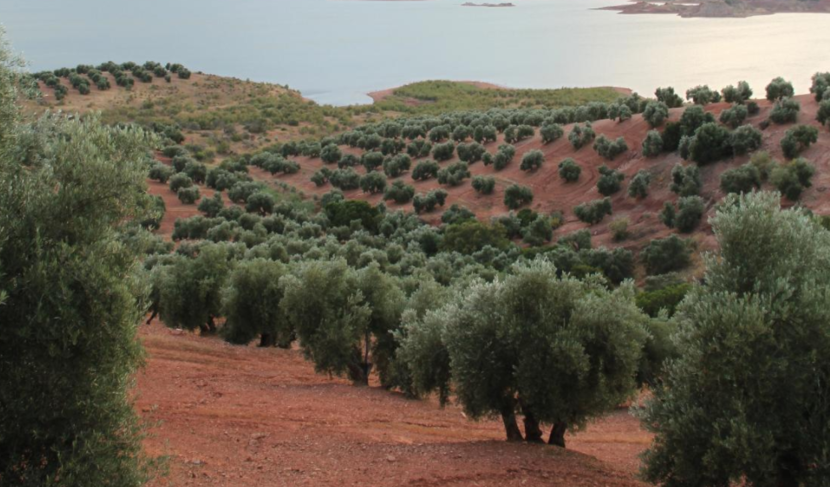
The following is a summary of what has been published regarding the most relevant issues in 2023 and the challenges foreseen for 2024.
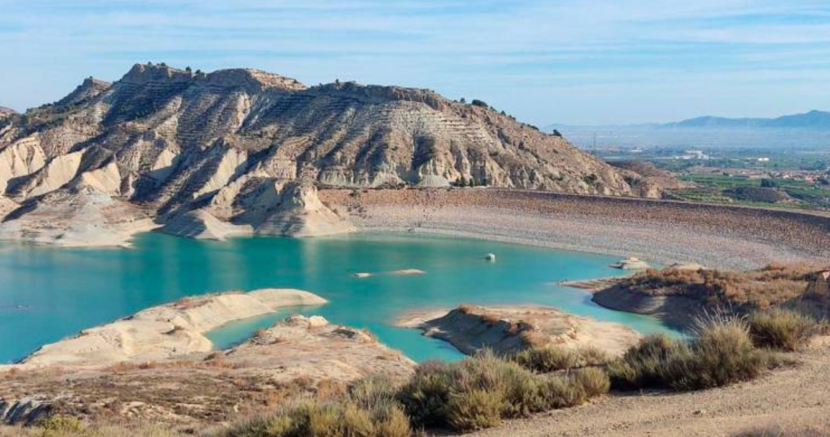
Weather conditions
The data confirmed that 2023 was the worst year since records have been kept for weather in Spain, especially the severe drought. This caused serious losses in very important crops for the country's agriculture, especially in olive groves, cereals and vineyards, with reductions of up to 50% in the value of production, and with clear effects throughout the food chain, in the form of higher prices for consumers. The grain harvest reached 10 million tons, compared to 17 million tons in the previous season and 24 million tons in 2021. The olive oil harvest has been below 700,000 tons for two consecutive years, although unlike cereals, the drop in volume is being partially offset by the soaring prices to around 10-12 euros/liter; the negative impact of this rise is the reduction of more than 40% in demand, both in the domestic and foreign markets. Wine production was only 30.6 million hectoliters, compared to 35.7 million hectoliters the previous year. In addition to the drop in production, there is a permanent fall in demand in the domestic market.
In view of the water shortage situation, together with the invasion of Ukraine effects, the government approved direct support measures of more than €1 billion.
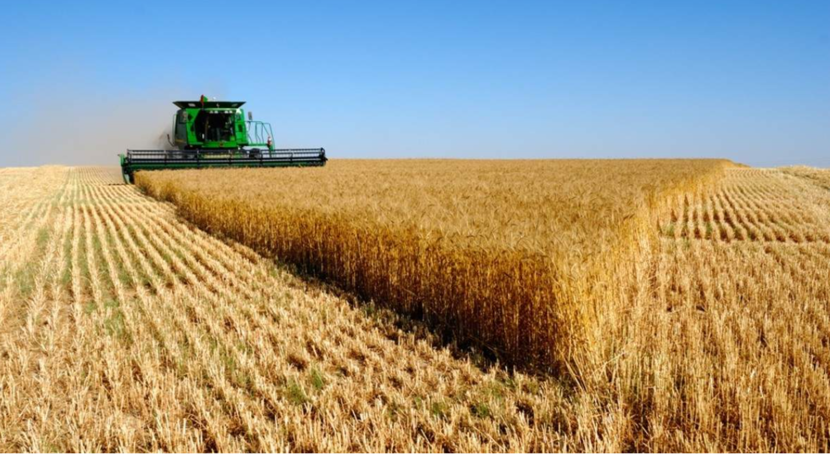
In 2024, the lack of water will continue to be an issue of confrontation between the regional administrations and also, as has occasionally been the case until now, between the Ministry for Ecological Transition and the Ministry of Agriculture. In this context, minister Ribera is against increasing water for irrigation. For Prof. Lamo de Espinosa, a former minister of Agriculture, "Mr. Planas will have to protect the agrarian criteria and priorities in the face of Ecological Transition’s interests in such sensitive issues as water plans, ecological flows of rivers or cuts in water supplies. A greater understanding of the problems that the continuing drought causes in agriculture is required in addition to substantial investments in water infrastructures, access to alternative sources of water, among others".
Given the complex political organization of Spain, with a national government plus 17 regional governments with a wide range of powers, more and more experts are calling for a national water strategy agreed upon by all parties to coordinate policies and actions.
On the other hand, after years of tension over the situation of the Doñana National Park, the agreement reached between the Ministry of Ecological Transition and the government of Andalusia, which rules out the expansion of irrigation in the area in exchange for investments of €1.4 billion, has brought calm among public administrations and farmers and environmentalists. Meanwhile, the protests of the farmers affected by the cut in the Tajo-Segura transfer approved at the beginning of 2023 continue.
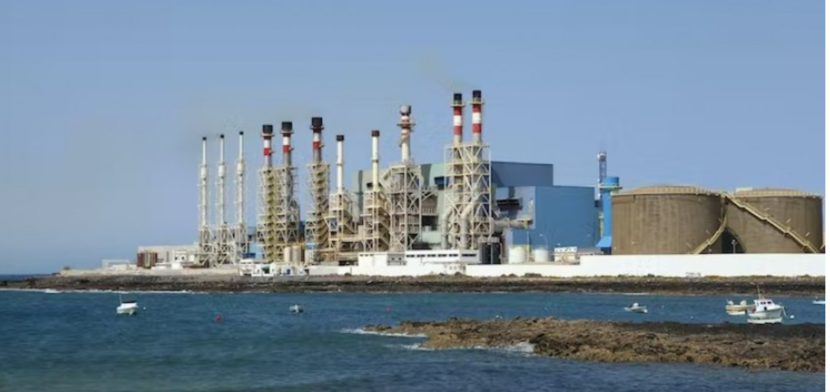
Some background information: Spain: Maintaining the competitiveness of the agri-food sector in the face of adverse conditions | Nieuwsbericht | Agroberichten Buitenland / Spain: Two billion euros’ aid to fight against drought | Nieuwsbericht | Agroberichten Buitenland
Inflation
Consumer food price increases moderated in the last months of 2023, although the cumulative increase over the year was 7.3%; 2022 ended up with an increase of 15.7%.
In order to contain this price increase, on 1 January 2023, VAT on some basic foodstuffs (bread, milk, bread flour, cheese, eggs, fruit and vegetables) was reduced to zero and to 5% on olive oil, seed oils and pasta. Despite this, consumers had to pay more for most of these products, especially olive oil, fruit, vegetables and potatoes. Other food items, such as non-olive oil, milk and flour, did fall.
These VAT reductions, which were initially approved for a period of six months, were extended until the end of 2023 and have now been further extended until 30 June 2024. In addition, olive oil will be added to the VAT-free list, provided that the corresponding bill is passed. All indications are that no more foodstuffs will benefit from reduced VAT, despite continued calls from sectoral organisations for meat and fish to be included as well.
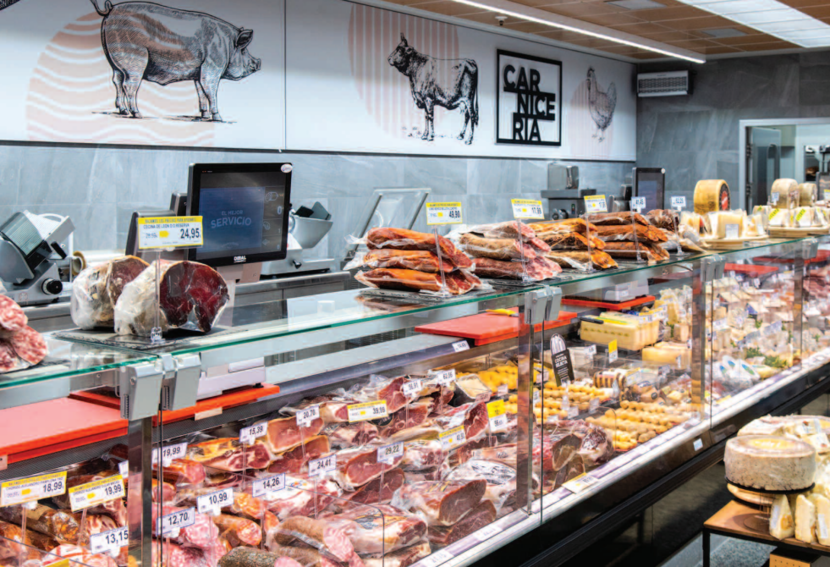
Some background information: Cooking paella has never been so expensive | Nieuwsbericht | Agroberichten Buitenland / Spain: analysis of household food consumption | Nieuwsbericht | Agroberichten Buitenland
Production costs
After soaring in the previous two years, farmers' production costs declined in 2023, but still remain high, mainly due to the fertilizer and energy prices, and continue to be a major concern in the day-to-day lives of producers.
The year 2022 ended up with an increase in production costs that the farmers’ organization UPA described as "brutal”. This led to negotiations for 2023 that concluded with the establishment of exceptional aid. To compensate for the increased costs caused by the increase in the price of fertilisers, the government granted aid of €300 million, as well as aid to compensate the price of agricultural diesel.
Wage costs are another issue of concern to farmers, also taking into account that by 2024 the guaranteed minimum wage has gone up another 5%, with a cumulative increase of 35% in the last four years. The farmers' organization Asaja stresses that these rises generate a great impact on farm accounts. It points out that they do not refuse to raise the minimum wage but they do demand "some support so that the agricultural sector can handle it".
The CAP 2023-2027
During the first year of implementation of the new CAP, with a total allocation of €47,000 million (Spain is the third EU recipient) for some 650,000 Spanish farmers, environmental and digital targets were not easy for farmers to meet, considering they were also severely affected by drought and high production costs. Depending on the political orientation of the organisation to which we refer, comments on the new CAP are more or less positive, although most agree that the international geopolitical situation and weather conditions is making very complex for agricultural activity to succeed in relation to those requirements.
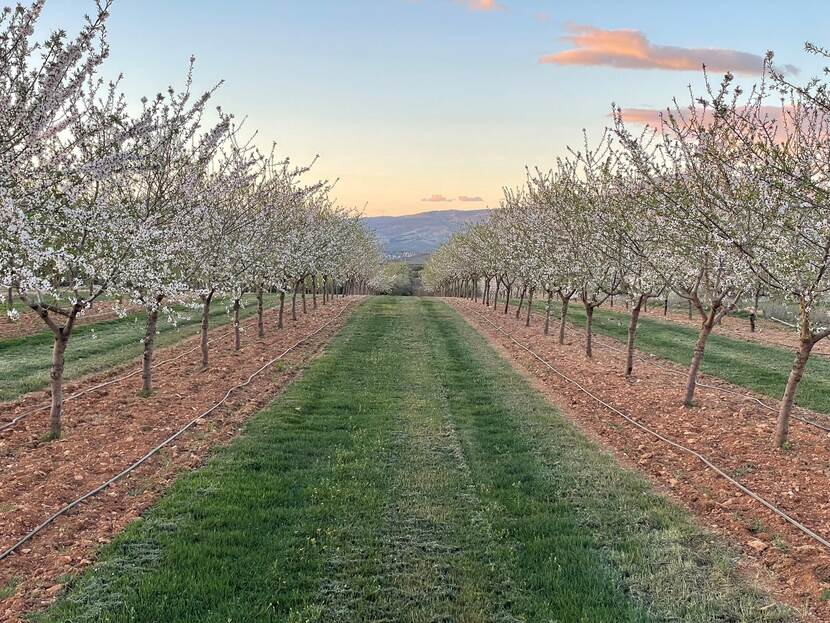
In an action described by UPA as a "massive commitment on the part of farmers", 86% of the CAP area, i.e. 19.1 million hectares, has applied for eco-schemes, although there are large differences between regions. There is a consensus among farmers that the eco-schemes need to be analysed one by one in order to adapt them to the reality of Spanish agriculture. The forthcoming implementation of the digital notebook is also an obstacle for the majority.
The CAP agricultural reserve was activated on several occasions in 2023, of which Spain was allocated €81 million.
With a view to 2024, bearing in mind that the new MEPs who come out of the EU June elections will have the power of co-decision on vital issues for the agri-food sectors (MFF and the foreseeable reform of the current CAP), journalist César Lumbreras says that "it is important that the lists presented by the different political parties include experts on EU budgetary matters and, especially, on everything related to the CAP”.
It is also possible that all issues not agreed during the Belgian Presidency will have to wait at least a year, for example the proposal on the sustainable use of plant protection products or the framework for the development of new genomics techniques, two topics highlighted by the Spanish Association of Agri-food Cooperatives.
Other challenges for 2024
Some other issues emerged in 2023 and are threatening to remain as challenges in 2024. Among the most relevant are the expansion of Epizootic Hemorrhagic Disease in the Iberian Peninsula, and a food industry highly affected by inflation and rising costs, to which new regulatory costs have been added, such as the plastic tax and the new European regulation on packaging.
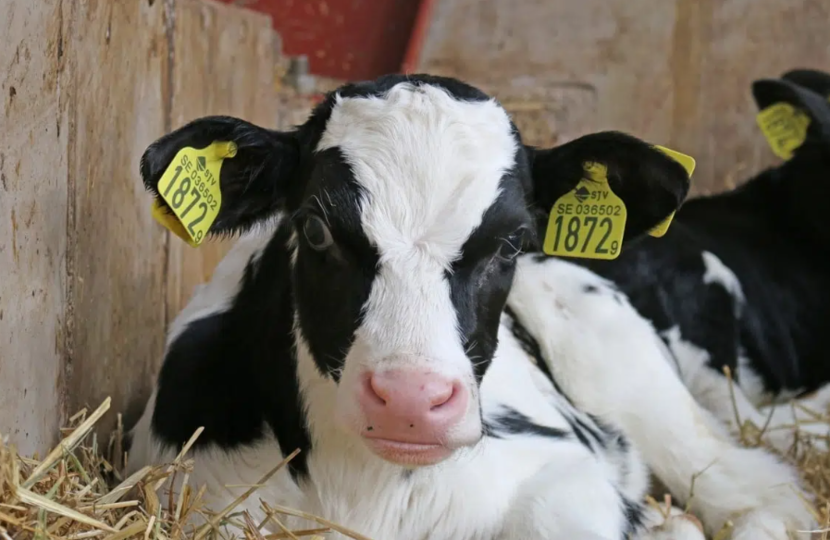
Farm income up 11% in 2023
The first estimate of the Ministry of Agriculture, Fisheries and Food sets farm income at current prices in 2023 at €31,931 million, 11% more than the previous year. An increase, which in real terms, i.e. taking into account the effects of inflation, is limited to 5.5%. For the farmers' organization COAG, if this income is compared with the average of the last five years (2019-2023), it is observed that in 2023 it is only 1.1% higher. Analyzing the evolution in real terms since 2003, in 20 years, the sector lost 15% of its income (Fig. 1).
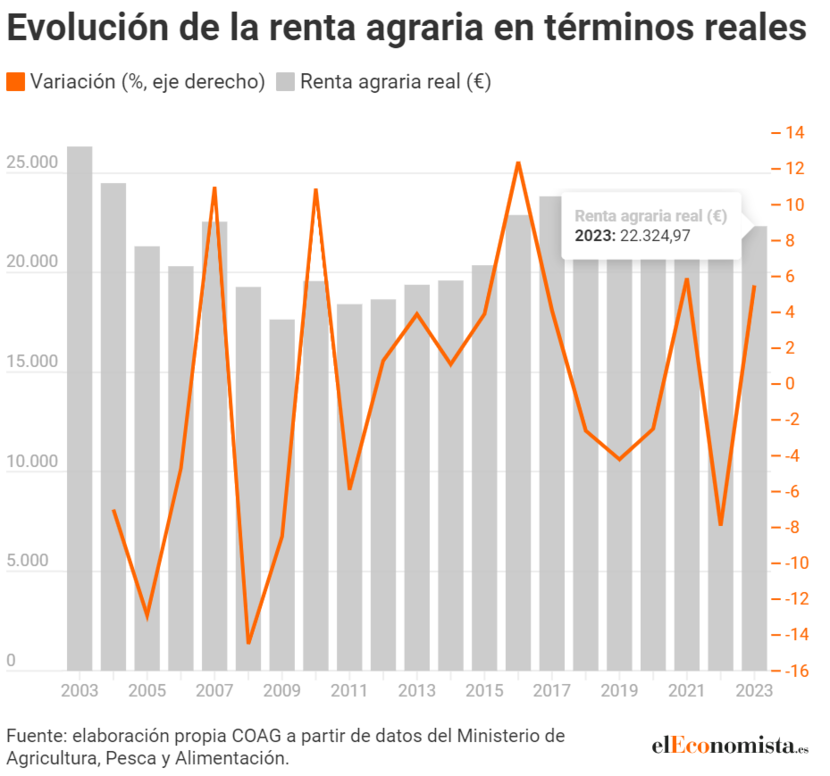
The increase in farm income in 2023 was due both to the rise in the value of agricultural output (which reached a new high of €65,081 million) and to the drop in production costs.
Crop production fell by 3.4%, due to a drop in the volume produced (-11.7%), partly offset by the rise in prices (+9.4%). Performance was uneven by sector. While production fell in sectors such as olive oil (-59%), cereals (-35%) and wine (-21%), prices increased in olive oil (+71%), fodder plants (+36%), fruit (+13%), vegetables (+9.5%) and potatoes (+7%). The cereals sector added a 24% drop in prices to the drop in production.
In livestock output, the value increased by 13.4% due to the 16.3% increase in prices, while the volume produced decreased by 2.5% with respect to 2022. The main production decreases were in sheep and goats (-10%) and cattle (-7%), with increases in poultry production. On the other hand, there has been a generalized increase in all products, highlighting eggs (+30%), milk (+22%), pork (+21%). The positive side is in production costs, which decreased, especially in energy, -31.9%, and fertilizers, -27.4%.
For COAG, the figures for farm income are "disheartening", because if its growth is due to the good performance of sectors such as fruit and vegetables, pork and milk, the fact is that sectors of enormous importance for Spain, such as arable crops, olive groves and vineyards, have had very poor results.
As far as production costs are concerned, although it is true that there has been a decrease of 4.6% compared to 2022, according to UPA, these costs are extremely high compared to 2021 and 2020, with increases of 19 and 34% respectively; these high costs are here to stay and will affect food production over the next decade.
General elections in July 2023
The re-appointed minister for Agriculture, Fisheries and Food Luis Planas, assured to continue to prioritise “youth and women, water and digitalization”, so that in his third term in office he will stick to his established course.
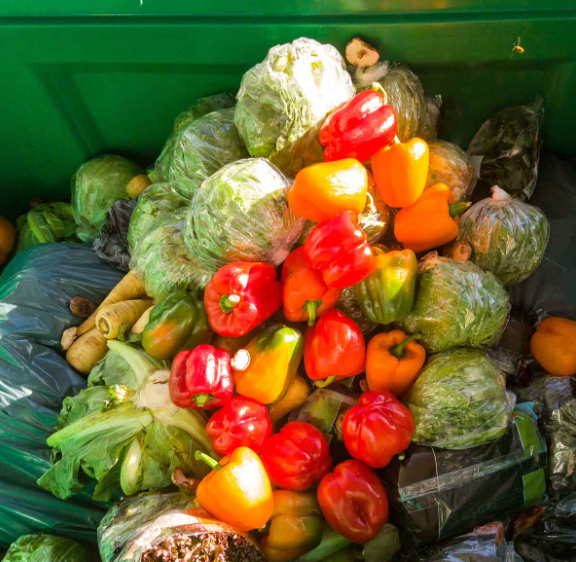
In his inauguration speech last November, PM Sánchez announced a Family Farming Act and a National Food Strategy. Regarding the former, by the end of 2023, work had already begun on its drafting. The aim seems to be to have it approved by 2025. Nothing is known so far about the food strategy.
On 9 January, the Council of Ministers approved the draft act on the Prevention of Food Losses and Food Waste, which will now enter parliamentary procedure.
A complex scenario at EU level
According to the Spanish Association of Agri-food Cooperatives, an opinion widely shared by the majority of farmers, in the EU we continue to have major debates arising from the Farm to Fork strategy or the Law on the Restoration of Nature. They state that there has been a great divergence between the ambitious objectives of the current European Commission and the reality of production and the market, which is putting the agri-food sector in check. They say they are frustrated by highly ideologized discussions, outside the scientific evidence and with ambitious objectives that have not measured the economic and social impacts. For the cooperatives, the scenario is complex because society does not seem to realise the delicate situation that food production is going through and the costs involved in going ahead with certain “green proposals”, at the same time as citizens are demanding low-cost food.
For Prof. Lamo de Espinosa, "with a view to 2024, we must be attentive to the new orientations that may come from an increasingly interventionist EC, from the new animal welfare standards, from the new paradigm of sustainability, from a restoration of nature does not seem to be aligned with farming targets...".
Spain’s presidency of the EU Council
This document, prepared by the Spanish government, presents what it considers to be the major achievements during its rotating presidency hold the second half of 2023: AGRIFISH | The Spanish presidency concludes with progress towards a European agriculture and fisheries fit for the future (europa.eu)
Some background information: Agrifood sectors priorities facing Spain's upcoming EU presidency | Nieuwsbericht | Agroberichten Buitenland